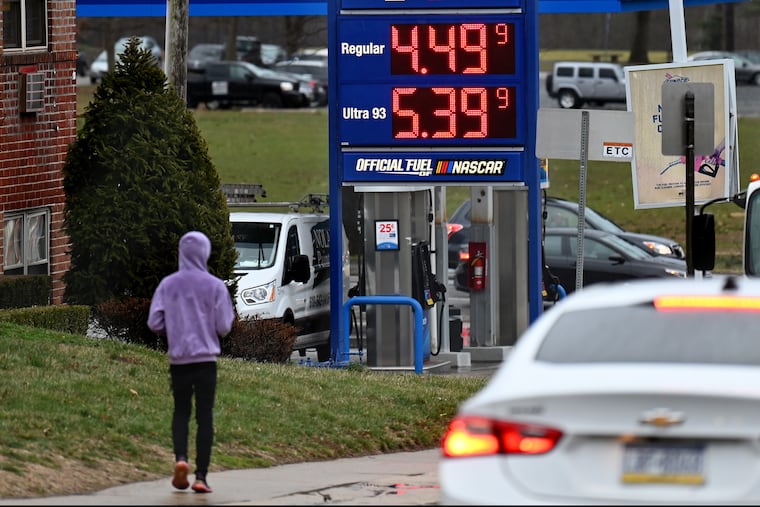Gas in Philadelphia area hits all-time high, tops $4.50 a gallon
Philadelphia drivers were paying $3.054 a gallon on average a year ago.

Average gas prices in the Philadelphia area hit an all-time high Friday, reaching an average of $4.566 a gallon of regular unleaded gas, according to AAA.
As gas prices continue to fluctuate and rise across the country, Philadelphia saw the all-time high for its average gas prices by the end of the week. The average gas price for diesel fuel also hit a record, at $6.274 a gallon. Philadelphia drivers were paying $3.054 a gallon on average a year ago.
» READ MORE: How much does gas cost in Philly right now?
The current average gas price for regular unleaded fuel in Pennsylvania is $4.461, compared with $3.040 this time last year.
In neighboring New Jersey, the average gas price Friday hovered just under the all-time high of $4.311 a gallon of regular unleaded set March 10. The average gas price in New Jersey on Friday was $4.306 a gallon of regular unleaded fuel.
Analysts say gas prices are rising due to concerns about less Russian oil entering the global market. As a result, more U.S. residents are seeing prices at the pump top $4 a gallon just ahead of the summer driving season.
In March, President Joe Biden ordered the release of one million barrels of oil a day from the nation’s strategic petroleum reserve for six months, a bid to control spiking energy prices after the United States and allies imposed steep sanctions on Russia over its invasion of Ukraine.
» READ MORE: Where to find cheap gas in Philadelphia
At the time, the president said it was not known how much gasoline prices could decline as a result of his move, but he suggested it might be “anything from 10 cents to 35 cents a gallon.” Gas was averaging about $4.279 a gallon in the country as of Friday.
The president also wants Congress to impose financial penalties on oil and gas companies that lease public lands but are not producing. He said he will invoke the Defense Production Act to encourage the mining of critical minerals for batteries in electric vehicles, part of a broader push to shift toward cleaner energy sources and reduce the use of fossil fuels.
This article contains information from the Associated Press.